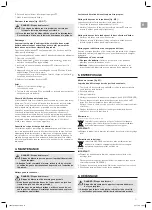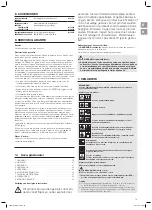
b) Never allow children or people unfamiliar with these instructions to use the
machine. Local regulations can restrict the age of the operator.
c) Never operate the machine while people, especially children, or pets are
nearby.
d) Keep in mind that the operator or user is responsible for accidents or hazards
occurring to other people or their property.
Preparation
a) While operating the machine always wear substantial footwear and long trou-
sers. Do not operate the machine when barefoot or wearing open sandals.
Avoid wearing clothing that is loose fitting or that has hanging cords or ties.
b) Thoroughly inspect the area where the machine is to be used and remove all
objects which can be thrown by the machine.
c) Before using, always visually inspect to see that the blade, blade bolt and the
blade assembly are not worn or damaged. Replace worn or damaged com-
ponents in set to preserve balance. Replace damaged or unreadable labels.
d) Before use check the supply and extension cord for signs of damage or
aging. If the cord becomes damaged during use, disconnect the cord from
the supply immediately.
DO NOT TOUCH THE CORD BEFORE DISCONNECTING THE SUPPLY.
Do not use the machine if the cord is damaged or worn.
Operation
a) Operate the machine only in daylight or in good artificial light.
b) Avoid operating the machine in wet grass.
c) Always be sure of your footing on slopes.
d) Walk, never run.
e) Mow across the face of slopes, never up and down.
f) Exercise extreme caution when changing direction on slopes.
g) Do not mow excessively steep slopes.
h) Use extreme caution when reversing or pulling the machine towards you.
i) Stop the blade(s) if the machine has to be tilted for transportation when cross-
ing surfaces other than grass, and when transporting the machine to and from
area to be used.
j) Never operate the machine with defective guards or shields, or without safety
devices, for example deflectors and / or grass collector, in place.
k) Switch on the motor carefully according to instructions and with feet well
away from the blade(s).
l) Do not tilt the machine when switching on the motor, except if the machine
has to be tilted for starting. In this case, do not tilt it more than absolutely
necessary and lift only the part, which is away from the operator.
m) Do not start the machine when standing in front of the discharge opening.
n) Do not put hands or feet near or under rotating parts. Keep clear of the dis-
charge opening at all times.
o) Do not transport the machine while the power source is running.
p
2
) Stop the machine, and remove the disabling device. Make sure that all moving
parts have come to a complete stop:
– whenever you leave the machine,
– before clearing blockages or unclogging chute,
– before checking, cleaning or working on the machine,
– after striking a foreign object. Inspect the machine for damage and make
repairs before restarting and operating the machine;
if the machine starts to vibrate abnormally (check immediately):
– inspect for damage,
– replace or repair any damaged parts,
– check for and tighten any loose parts.
Maintenance and storage
a) Keep all nuts, bolts, and screws tight to be sure the machine is in safe work-
ing condition.
b) Check the grass collector frequently for wear or deterioration.
c) Replace worn or damaged parts for safety.
d) On machines with multi blade, take care as rotating one blade can cause
other blades rotate.
e) Be careful during adjustment of the machine to prevent entrapment of the
fingers between moving blades and fixed parts of the machine.
f) Always allow the machine to cool down before storing.
g) When servicing the blades be aware that, even though the power source is
switched off, the blades can still be moved.
h) Use only genuine replacement parts and accessories.
Additional safety warnings
Battery safety
Read all the safety and general instructions.
Failure to observe the safety and general instructions may result in electric shock,
fire and / or serious injury.
Store these instructions in a safe place. Only use the charger if you can
fully evaluate all functions and carry them out without restrictions, or if you have
received corresponding instructions.
v
Supervise children during use, cleaning and maintenance.
This will ensure that children do not play with the charger.
v
Charge only lithium-ion batteries of the POWER FOR ALL system type
PBA 18V with a capacity of 1.5 Ah or more (5 battery cells or more).
The battery voltage must match the battery charging voltage of the
charger. Do not charge any nonrechargeable batteries.
Otherwise there is a risk of fire and explosion.
v
Do not expose the charger to rain or wet conditions.
Water entering a power tool will increase the risk of electric
shock.
v
Keep the charger clean. Dirt poses a risk of electric shock.
v
Always check the charger, cable and plug before use. Stop using the
charger if you discover any damage. Do not open the charger yourself,
and have it repaired only by a qualified specialist using only original
replacement parts.
Damaged chargers, cables and plugs increase the risk of electric shock.
v
Do not operate the charger on an easily ignited surface (e. g. paper,
textiles, etc.) or in a flammable environment.
There is a risk of fire due to the charger heating up during operation.
v
In order to avoid safety hazards, if the power supply cord needs to be
replaced, this must be done by GARDENA or by a customer service centre
that is authorised to repair GARDENA power tools.
v
Do not operate the product while it is charging.
Products sold in GB only: Your product is fitted with an BS 1363/A approved
electric plug with internal fuse (ASTA approved to BS 1362). If the plug is not
suitable for your socket outlets, it should be cut off and an appropriate plug fitted
in its place by an authorised customer service agent. The replacement plug
should have the same fuse rating as the original plug. The severed plug must
be disposed of to avoid a possible shock hazard and should never be inserted
into a mains socket elsewhere.
v
These safety warnings apply only for lithium-ion batteries of the
POWER FOR ALL system PBA 18V.
v
Only use the battery with products of the POWER FOR ALL system
manufacturers. This is the only way in which you can protect the battery
against dangerous overload.
v
Recharge only with the charger specified by the manufacturer.
A charger that is suitable for one type of battery pack may create a risk of fire
when used with another battery pack.
v
The battery is supplied partially charged.
To ensure full battery capacity, fully charge the battery in the charger before
using your power tool for the first time
v
Keep battery packs out of the reach of children.
v
Do not open the battery. There is a risk of short-circuiting.
v
In case of damage and improper use of the battery, vapours may be
emitted. The battery can set alight or explode. Ensure the area is well
ventilated and seek medical attention should you experience any adverse
effects. The vapours may irritate the respiratory system.
v
If used incorrectly or if the battery is damaged, flammable liquid may
be ejected from the battery. Contact with this liquid should be avoid-
ed. If contact accidentally occurs, rinse off with water. If the liquid
comes into contact with your eyes, seek additional medical attention.
Liquid ejected from the battery may cause irritation or burns.
v
If the battery is damaged liquid can be ejected and cover nearby
surfaces. Check affected parts.
Clean these parts or change them if necessary.
v
Do not short-circuit the battery pack. When the battery pack is not
in use, keep it away from other metal objects, like paper clips,
coins, keys, nails, screws or other small metal objects, that can make
a connection from one terminal to another.
Shorting the battery terminals together may cause burns or a fire.
v
The battery can be damaged by pointed objects such as nails or
screwdrivers or by force applied externally. An internal short circuit may
occur, causing the battery to burn, smoke, explode or overheat.
v
Never service damaged battery packs. Service of battery packs should
only be performed by the manufacturer or authorized service providers.
v
Protect the battery against heat, e. g. against continuous intense
sunlight, fire, dirt, water and moisture.
There is a risk of explosion and short-circuiting.
v
Only operate and store the battery at an ambient temperature
between – 20 °C and + 50 °C.
Do not leave the battery in your car in the summer, for example.
At temperatures of < 0 °C some devices may experience a loss of power.
v
Only charge the battery at an ambient temperature which is between
0 °C and + 45 °C. Charging outside of this temperature range can increase
the risk of damage to the battery and pose a fire hazard.
Electrical safety
DANGER! Cardiac arrest!
This product makes an electromagnetic field while it operates. This
field may under some conditions interfere with active or passive medical
implants. To decrease the risk of conditions that can possibly injure or
kill, we recommend persons with medical implants to speak with their
physician and the medical implant manufacturer before you operate the
product.
Only use the battery product between – 10 °C and 40 °C.
Do not use under wet conditions.
Protect the battery contacts from moisture.
EN
10
14621-20.960.01.indd 10
03.11.20 18:21











































